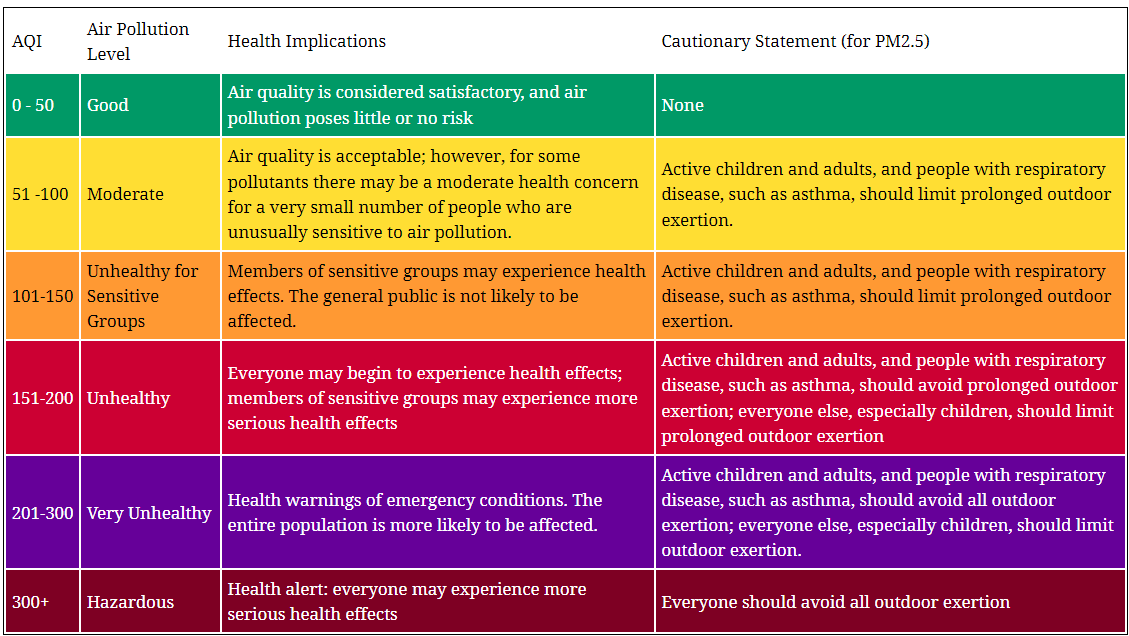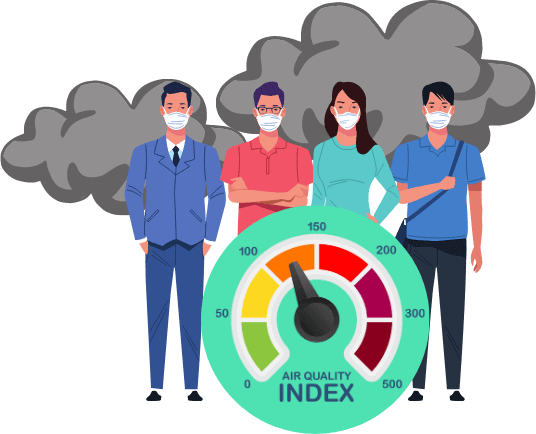
If the air isn't clean, the future will be hard to breathe.
| City name | AQI | Danger Level | Equivalent cigarettes smoked | Life expectancy reduced in yr. |
|---|
- Ground-level ozone
- Particle pollution/particulate matter (PM2.5/pm 10)
- Carbon Monoxide
- Sulfur dioxide
- Nitrogen dioxide
Reporting air quality is done on a variety of different point scales in various countries. In the United States, for instance, a score between 0 and 50 on a scale of 500 is deemed satisfactory. Dangerousness scales between the 301st and 500th points. It appears that India also uses the 500-point system. Major pollution concentrations are recorded daily by various monitoring stations. Standard EPA formulas are applied to these raw measurements to derive an AQI value for each pollutant (ground-level ozone, particle pollution, carbon monoxide, and sulphur dioxide). The AQI value for a given day is the one that is greatest among these maximums.
Good (50) - Having Little to No Effect
Moderate(51-100) - Some people may experience mild respiratory issues.
Pollution levels are Unhealthy for the sensitive group (101 to 200), which can be bothersome for those with heart or lung conditions, young children, and the elderly.
Grade: (201-300) Unhealthy (May cause breathing difficulty in people on prolonged exposure; May cause pain to people with a heart condition)
Very Unhealthy (300) - Prolonged exposure may cause respiratory sickness. Those with preexisting respiratory or cardiovascular conditions may feel the effects more strongly.
In the Hazardous range (401-500), healthy persons can experience breathing difficulties, and those with preexisting lung or heart conditions have life-threatening episodes. Mild exercise may not be without its challenges.

Those suffering from air pollution-related ailments should be aware of the daily levels of air pollution in their area.
The Air Quality Index's (AQI's) primary purpose is to facilitate comparisons between local air quality and that of other areas or cities.
It's also useful for pinpointing insufficient monitoring procedures and subpar standards.
Changes in air quality can be analysed with the aid of the AQI (improvement or degradation).
The air quality index (AQI) provides useful data to the general population. People whose ailments are exacerbated or caused by air pollution would benefit greatly from this.
Outdoors or indoors, air pollution occurs when a substance (chemical, physical, or biological) alters the innate properties of the atmosphere and poses a health risk to anyone in its path. Many everyday activities, as well as cars, factories, and even forest fires, contribute to the unhealthy levels of air pollution in our communities.
- Asthmatics, chronic bronchitis sufferers, and emphysema patients
- Intended Audience: Young People of All Ages
- Participants in vigorous outdoor activities, regardless of age
- Some otherwise healthy individuals may experience increased sensitivity to ozone.
Warnings about climate change and information about pollution haven't been able to persuade the public that we have a serious pollution problem. Researchers employ unintuitive methods of assessment, and the media predicts long-term effects that have yet to materialise. What if, however, we found out that just by breathing in our cities, everyone ends up "smoking" the equivalent of a pack of cigarettes per month? The AQI is how we make the daily air quality data accessible to the general public. Using the rule of thumb developed by Berkely Earth (one cigarette per day is about similar to a PM2.5 level of 22 mg/m3), the AQI information page links to open databases of Air-Quality Stations throughout the world. Find out the quality of the air where you are using the cigarettes' location feature, or use the map search function to locate stations in other areas.
In 2022, the average life expectancy in India was 70.19 years, up 0.33 percentage points from the previous year. India's life expectancy is 2021 was 69.96 years, up 0.33 percentage points from the previous year. Indians should expect to live an average of 69.73 years in 2020, up 0.33 years from 2019. However, the effects of air pollution on human health and lifespan are not taken into account in this estimation.
On average, you lose 8 minutes every day to smoking. When you live in a city with a high air quality index, your life expectancy decreases by a certain number of minutes, hours, or days.
It's not easy to make a difference in a city, but if we grasp the scope of our influence, we can begin constructing a better place to live, a better nation, and ultimately a better world.

